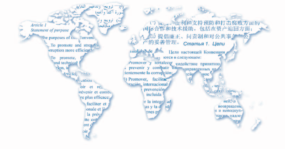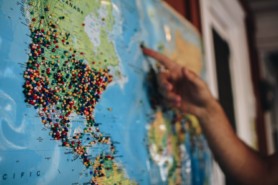International policing must gear up to tackle the challenge of organized crime as a major transnational threat to peace and stability, otherwise the many-headed beast will continue to thrive.
During my five years as the police adviser to the UN, the UN Police did a lot to raise awareness about the importance of fighting transnational organized crime within the broader context of peace and security, as evidenced by two groundbreaking resolutions in 2014 and 2017. The message is simple: for conflict prevention, and for peacebuilding efforts to be successful, the relevance of organized crime must be understood, its threats identified and vulnerabilities mitigated.
In contemporary conflict environments, actors who are not party to ceasefire processes or peace agreements may threaten such efforts towards stability. Many belong to a nexus that links transnational organized crime, violent extremism and international terrorism. Organized crime takes advantage of conflict and war to counter law-enforcement efforts, while extremism and international terrorism use organized crime as a business model. Thus, efforts aimed at re-establishing governance are attacked by criminals and violent extremists. This is a menace for countries shaken by conflict, as peace depends on legitimate governance in which all communities find their space.
The consequences of transnational organized crime – such as trafficking in human beings, forms of exploitation and slavery, and trafficking in weapons or narcotics – may also contribute to the current global rise of nationalism and populism. And, more recently, peace operations have become a target themselves.
Organized crime and violent extremism not only weaken existing governance, they also establish their own governance systems. Islamic State is a case in point, being an extremist ideology that has imposed an entire bureaucratic, public-services and tax system. The organization also uses criminal enterprise to generate revenue, much of it transnational. Hence it can be difficult to distinguish between individuals and networks representing ‘classical’ transnational organized crime and violent extremists who benefit from it.
Diplomatic and military efforts are limited or rendered toothless given the complex nature of the organized-crime threat. Individual states and the international community struggle against a faceless, multidimensional and highly secretive enemy. Unlike Islamic State, which exploits a sophisticated media machine, transnational organized crime has no public voice; instead, it thrives on deception, bringing to mind the many-headed Hydra of Greek mythology, which proved almost impossible to slay.
When faced with this sort of complex challenge, the authorities often resort to efforts of disruption. But every experienced law-enforcement officer knows that disruption can never be more than a temporary alternative to the real objective: permanently disbanding the network. Multinational organizations need long-term strategies – something that tends not to come naturally to political processes. And neither foreign ministries nor military forces have experts on transnational organized crime, crime prevention, community-oriented policing or intelligence collection within a civilian legal framework. Responding to organized crime in complex settings requires careful, thoughtful engagement, capable of sustaining a long-term effort. Policing expertise is essential. However, this sort of expertise has often played second fiddle to military responses, often with negative consequences.
Transnational organized crime is like a highly complex technological system that functions through an untold number of connections and nodes. Similarly, responding to it, much like operating a complicated piece of machinery, necessitates a detailed understanding of how the system works, otherwise there is a risk of further destabilization and thriving illicit activity.
Strengthening the peacekeeping/law enforcement response to organized crime
In June 2016, ministers of the interior, chiefs of police and other high-level officials from more than 100 member states gathered at the UN headquarters for the first-ever summit of UN police chiefs. Participants called for the need to tackle transnational organized crime and deploy more specialist expertise – based on specific capacity gaps within national institutions and priorities requested by host states. They encouraged stronger partnerships between the UN Police, the African Union, the European Union, INTERPOL, EUROPOL, the emerging AFRIPOL, AMERIPOL, ASEANAPOL, the Organization for Security and Co-operation in Europe, the International Association of Chiefs of Police and other partner organizations. In June 2018, the UN will host the second UN Chiefs of Police Summit, which will aim to take stock and move forward on organized crime.
Meanwhile, Secretary General António Guterres argues that the future of peacekeeping operations is linked to UN Police and that more investment in this area will be essential. The same sentiment can be found in the 2016 European Union Global Strategy. The EU is working on getting EUROPOL closer to crisis management missions of the EU abroad. The recognition that experts on transnational organized crime need to be provided to support actions within a foreign-policy context is slowly growing, although I don’t see this reflected in national police budgets.
Between 2014 and 2016, the UN also finalized the policy of the Strategic Guidance Framework (SGF). This long-standing, worldwide effort, supported by a global network of law-enforcement professionals, enhances the effectiveness of the UN Police in peace operations. Mapping out the interdependency of community-oriented policing and intelligence-led policing is but one of many examples of how the SGF tackles the challenges presented by transnational threats, including that of organized crime. The SGF has become an internationally acknowledged reference point for how to strengthen host states’ law-enforcement capacities and capabilities, giving international policing a first-ever framework. Meanwhile, the establishment of a Serious and Organized Crime Team in the UN Police Division, and the creation of an entire network of focal points on transnational organized crime are examples of efforts to translate the SGF framework into practice.
Such efforts are key to an effective global response to a global threat. But there is no space for complacency. We need to be seriously concerned. We are witnessing the erosion of a willingness to think globally in the face of global challenges and threats, in an environment where no local event can be separated from the global, and vice versa – often with unforeseen consequences. But populism thrives on the pretence that there are easy solutions to the world’s problems and that those who say otherwise are merchants of ‘fake news’. Nationalist sentiment rolls back global and regional achievements, and presents a threat to more integration. And, at the extreme end of the scale, a new wave of fascist movements are intent on destroying what has been achieved by liberal societies, including the rule of law. I know of no examples in contemporary history where such assaults on the rule of law and increasing patterns of authoritarianism have not led to greater levels of organized crime and corruption.
Impressive steps have been made in bringing about a truly global approach to international policing. But these achievements can easily be wiped out. New and resolute thinking is now needed to prevent organized crime from benefiting from the erosion of the rule of law. We have to better acknowledge the complex effects of transnational crime on conflict and war; we have to acknowledge that inadequate efforts to deal with conflict, or to help rebuild post-conflict settings, nurture transnational crime’s ability to thrive.
Ultimately, fighting crime is a civilian core function within society. As the Global Initiative advocates, networks can only be fought by networks – in this case, networks of law-enforcement and criminal-justice organizations. In states and regions already weakened by conflict and war, transnational crime thrives and domestic law-enforcement partner organizations struggle. Whether through outright assistance or temporary international involvement, we have to help our partners from the outset. It requires our active commitment not only with diplomats and soldiers, but also with police and justice expertise. And it requires doing things together, including with national and international law-enforcement agencies.
Derrotar a la hidra
Los desafíos de la Policía de la ONU frente a la delincuencia organizada
La vigilancia policial internacional debe acelerar el ritmo de respuesta a los retos que plantea la delincuencia organizada como una grave amenaza transnacional a la paz y la estabilidad. De no hacerlo, el monstruo de múltiples cabezas seguirá medrando.
Durante mis cinco años como asesor de asuntos policiales para la ONU, la Policía de la ONU trabajó mucho en la generación de conciencia sobre la importancia de luchar contra la delincuencia organizada transnacional dentro de un contexto general de paz y seguridad, tal y como queda plasmado en dos resoluciones innovadoras en 2014 y 2017. El mensaje es simple: si queremos prevenir el conflicto y que triunfen los esfuerzos para mantener la paz, debemos comprender la relevancia de la delincuencia organizada, identificar sus amenazas y mitigar las vulnerabilidades.
En los contextos actuales de conflicto, aquellos que no se sumen a los procesos de cese del fuego y de acuerdos para la paz pueden poner en riesgo estos esfuerzos destinados a alcanzar la estabilidad. Muchos pertenecen a un nexo que une la delincuencia organizada transnacional, el extremismos violento y el terrorismo internacional. La delincuencia organizada saca ventaja de los conflictos y las guerras, y el extremismo y el terrorismo internacional basan su modelo de negocios en la delincuencia organizada. Esto significa que tanto delincuentes como extremistas violentos irán contra cualquier esfuerzo encaminado a re-establecer la gobernanza – una verdadera amenaza para los países azotados por conflictos, ya que la paz depende de una gobernanza legítima en la que todas las comunidades encuentran su espacio.
Las consecuencias de la delincuencia organizada transnacional – como la trata de personas, las formas de explotación y esclavitud, el contrabando de armas y drogas ilícitas – también pueden estar contribuyendo al alza mundial de los nacionalismos y los populismos. Por otro lado, en los últimos tiempos, las propias operaciones de paz se han convertido en un blanco de estos grupos.
La delincuencia organizada y el extremismo violento no sólo debilitan la gobernanza legítima, sino que también establecen su propio sistema de gobierno. Ejemplo de esto es Estado Islámico, una ideología extremista que ha implantado un sistema burocrático, fiscal y que presta servicios públicos. La organización también recurre a actividades delictivas, la mayoría transnacionales, como motor de sus ganancias. Es debido a esto que puede resultar difícil distinguir individuos y redes que representan la forma “clásica” de delincuencia organizada transnacional, de extremistas violentos que de ella se benefician.
Los esfuerzos diplomáticos y militares son limitados o considerados ineficaces dada la compleja naturaleza de la amenaza que plantea la delincuencia organizada. Los Estados individuales y la comunidad internacional tienen dificultades para enfrentar a este enemigo sin rostro, multidimensional y tan sigiloso. A diferencia de Estado Islámico que utiliza una máquina mediática sofisticada, la delincuencia organizada no tiene una voz pública; por el contrario, prospera en el engaño, trayéndonos a la memoria las múltiples cabezas de la hidra en la mitología griega, casi imposible de matar.r
Cuando se enfrentan a este tipo de retos complejos, las autoridades suelen intentar interrumpirlos. Pero cualquier oficial de policía experimentado sabe que este tipo de intervenciones son sólo una alternativa temporaria al objetivo real: desbandar la red de forma permanente. Las organizaciones multinacionales necesitan desarrollar estrategias de largo plazo – algo que no parece ser natural en los procesos políticos. Y ni los ministerios de asuntos exteriores ni las fuerzas militares cuentan con expertos en delincuencia organizada transnacional, prevención del delito, vigilancia policial orientada a la comunidad, o recolección de inteligencia dentro de un marco jurídico civil. Las respuestas a la delincuencia organiza en contextos complejos exigen de un compromiso cuidadoso y meditado, capaz de sostener esfuerzos a largo plazo. A pesar de que la experiencia policial es esencial, siempre se le ha restado valor en las respuestas militares, muchas veces con consecuencias negativas.
La delincuencia organizada transnacional es como un sistema tecnológico complejo que funciona mediante un sinfín de conexiones y nodos. Igual que al operar una máquina sofisticada, las respuestas exigen entender cómo funciona el sistema, caso contrario se corre el riesgo de crear mayor inestabilidad y el ambiente propicio para el desarrollo de la delincuencia organizada.
Fortaleciendo el mantenimiento de la paz: La respuesta policial a la delincuencia organizada.
En junio de 2016, ministros del interior, jefes de policía y otros funcionarios de alto rango de más de 100 Estados miembros, se reunieron en la sede de la ONU con motivo de la primera cumbre de jefes de policía de la ONU. Los participantes llamaron a la necesidad de abordar la delincuencia organizada transnacional y de desplegar mayor experiencia especializada – basada en brechas específicas en las capacidades dentro de las instituciones nacionales y en las prioridades de los países anfitriones. Se alentó a una asociación más robusta entre la Policía de la ONU, la Unión Africana, la Unión Europea, INTERPOL, EUROPOL, las emergentes AFRIPOL, AMERIPOL, ASEANPOL, la Organización para la Seguridad y Cooperación en Europa, la Asociación Internacional de Jefes de Policía, y otras organizaciones socias. En junio de 2018, la ONU celebrará la segunda Cumbre de Jefes de Policía de la ONU en miras a estudiar la situación y avanzar sobre asuntos relativos a la delincuencia organizada.
Entretanto, el Secretario General António Guterres, sostiene que el futuro de las operaciones de mantenimiento de la paz está unido a la Policía de la ONU y que una mayor inversión en este área es esencial. La misma posición puede encontrarse en la Estrategia Global de 2016 de la Unión Europea. La UE está trabajando para acercar la EUROPOL a las misiones de gestión de crisis de la UE en el exterior. Si bien lentamente se está reconociendo que se necesitan expertos en delincuencia organizada transnacional que apoyen las acciones dentro de un contexto de política exterior, todavía no lo veo reflejado en los presupuestos de las policías nacionales.
Entre 2014 y 2016, la ONU también terminó de dar forma al Marco de Orientación Estratégica (SGF). Este esfuerzo de muchos años y de alcance mundial, respaldado por una red mundial de policías, mejora la efectividad de las operaciones de paz de la ONU. Analizar la interdependencia de la vigilancia policial orientada a la comunidad y la vigilancia policial guiada por la inteligencia no es sino uno de los muchos ejemplos de cómo el SGF le hace frente a las amenazas transnacionales. El SGF se ha convertido en un punto de referencia reconocido internacionalmente sobre cómo fortalecer las capacidades policiales de los países anfitriones, dándole a la policía internacional su primer marco. Entretanto, el establecimiento de un Equipo contra Delitos Graves y Organizados de la División de Policía de la ONU y la creación de una red entera enfocada en la delincuencia organizada transnacional son ejemplos de esfuerzos que trasladan el SGF a la práctica.
Estos esfuerzos son vitales para responder efectivamente contra una amenaza internacional. Pero no hay lugar para la autocomplacencia. Debemos preocuparnos seriamente. Estamos siendo testigos de una erosión de la voluntad de pensar de manera global de cara a desafíos y amenazas mundiales, en un ambiente en donde ningún evento local puede ser separado de la esfera global y vice versa – muchas veces con consecuencias imprevistas. Pero el populismo prospera haciendo creer que hay soluciones simples para los problemas actuales, y que los que dicen lo contrario son vendedores de “noticias falsas”. El nacionalismo barre con todos los logros mundiales y regionales, y representa una amenaza a la integración. Y, en el extremo de la balanza, una nueva ola de movimientos fascistas busca destruir los que ha sido alcanzado por sociedades liberales, incluyendo el estado de derecho. No conozco ningún ejemplo en la historia contemporánea en donde tales ataques al estado de derecho y los crecientes patrones de autoritarismo no hayan generado mayores niveles de delincuencia organizada y corrupción.
Se han dado pasos importantísimos en la creación de un enfoque verdaderamente global de la vigilancia policial internacional. Pero estos logros pueden esfumarse fácilmente. Se necesitan ideas nuevas y determinantes para evitar que la delincuencia organizada se beneficie de la erosión del estado de derecho. Debemos reconocer mejor los efectos complejos de la delincuencia transnacional sobre el conflicto y la guerra, y admitir que cualquier medida desacertada para lidiar con el conflicto, o para ayudar a reconstruir ambientes en periodos post-conflicto, puede generar el ambiente propicio para que la delincuencia organizada prospere.
Por último, luchar contra la delincuencia es una función central civil dentro de una sociedad. Tal y como sostiene la Iniciativa Global, las redes sólo pueden ser combatidas por otras redes – en este caso, redes de policías y organizaciones de la justicia penal. En Estados y regiones ya debilitados por el conflicto y la guerra, la delincuencia transnacional crece y las organizaciones policiales asociadas encuentran dificultades para luchar contra ella. Sea tanto mediante la asistencia total o la implicación internacional temporaria, debemos ayudar a nuestros socios. Esto exige nuestro compromiso activo no sólo hacia diplomáticos y soldados, sino también hacia la policía y la justicia. Y exige también que trabajemos juntos, incluyendo a las agencias policías nacionales e internacionales.



